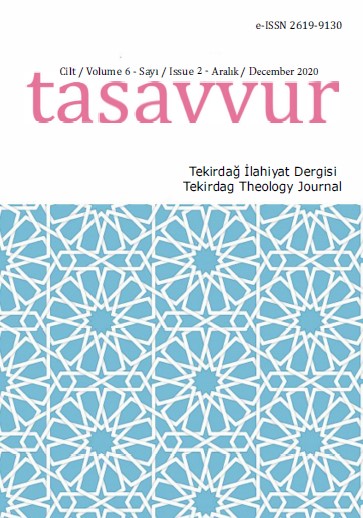Kur’ân ve Hadiserde Fıtrat Kavramının Anlamı Üzerine
On the Meanıng of the Qur and the Concept of Fıtrat in Hadıth
Author(s): Muhammet Ali TekinSubject(s): Islam studies, Hermeneutics
Published by: Tekirdağ Namık Kemal Üniversitesi İlahiyat Fakültesi
Keywords: Hadiṯh; Quran; Fitra; Human; Religion; Creation;
Summary/Abstract: It is a proven fact that if not ascribed the proper meaning to concepts, reaching wrong conclusions is inevitable in terms of understanding subject matters. Qua principal concept within the context of the whatness of (hu)man, in that sense, the concept of fitra [from the Arabic فطرة ‘instinct, creation; natural, primordial purity’] has still maintained its importance. Ascertaining the semantic vicinity of this concept —within the frame of man’s relationship both with his creator and with the fellow creature of the same kind and the universe alike, wherein he lives— when done, again, through the world he is part of could allow yielding correct conclusions as to this subject. In the tradition of Islamic scholarship, on the concept in question —mostly due to the prevailing discussions of the time vis-à-vis the creedal religious persuasion—, there could be multifarious assessments. What is aimed in this study is to ascertain the questions of in what sense the concept fitra, which is often used even today because of various reasons, has, in the course of history, been addressed and to what kind of discussions it has led, etc.; to present how it is understood and interpreted at present. For a research into the meaning of the concept fitra that finds its place in The Quran [Arabic: القرآن , Romanised: al-Qurʼān] and Aḥādīth [Arabic: حدیث ʾḥādīṯ, pl. أحادیث , ʾaḥādīṯ], it would be the healthiest way to treat the concept at issue within the context of the inner integrity of the texts, both of the Quranic verses and Ḥadīth, as well as the relationship between them. Moving forward with this thought in mind, in this study, first the lexical meaning of the concept via derivatives thereof was addressed and later, by way of the mentioned method, the cases within which it passes in The Quran and Aḥādīth were elevated.
Journal: Tasavvur Tekirdağ İlahiyat Dergisi
- Issue Year: 6/2020
- Issue No: 2
- Page Range: 1441-1490
- Page Count: 50
- Language: Turkish

